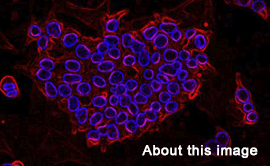Topical Group on Few-Body Systems & Multiparticle Dynamics
Our mission: To advocate, promote, and advance research on few-body systems.
Who we are: The APS Topical Group on Few-Body Systems and Multiparticle Dynamics was formed in January, 1985. We are an umbrella organization of atomic, molecular, nuclear, particle, and mathematical physicists, as well as quantum chemists, who are interested in the dynamics of “simple” systems. Such systems have relatively few degrees of freedom at some energy scale, and their study provides significant information about the dynamics of systems in a given area of physics, as well as identifies features common to systems in a variety of different sub-disciplines. Because we are an interdisciplinary group, many of our sessions at APS meetings are held jointly with other Groups and Divisions and feature specific “themes” from different fields.
What we do:
- Offer travel grants for students and postdoctoral researchers who are presenting their work at the APS April and DAMOP meetings.
- Organize and sponsor workshops and conferences (or portions thereof), and work to ensure representation of few-body topics at relevant workshops and conferences.
- Nominate APS Fellows whose accomplishments are centered around few-body topics.
- Communicate with and inform GFB members through regular emails and an annual newsletter.
How to join: To join any topical group, American Physical Society (APS) membership is required. All physicists who are APS members and who have an interest in few-body problems are encouraged to sign up for the Topical Group. Those who are not members are encouraged to join APS.
News & Announcements
GFB Travel Award
The following students were awarded 2020 GFB Travel awards.
Even though both the April meeting and DAMOP meetings were virtual in 2020, these students all made virtual presentations at their respective meetings.
Son Nguyen (Duke University) – 2020 April Meeting
He presented a talk titled: Large-Nc constraints on parity-violating low-energy constants in three-derivative pionless effective field theory
Aaron Bondy (U Windsor) – 2020 DAMOP Meeting
He made a presentation titled: Single vs. double electron emission following the beta decay of He-6
Bishnu Acharya (Missouri S&T) – 2020 DAMOP Meeting
He made a presentation titled: Photo-ionization of polarized lithium atoms out of an all-optical atom trap: A complete experiment
Sayan Choudhury (U Pittsburgh) – 2020 DAMOP Meeting
He presented a talk titled: Fast scrambling in a one-dimensional spin chain without random long range interactions
Congratulations to all the award winners! More information about the GFB Travel Award can be found at: https://www.aps.org/units/gfb/awards/travel-grants.cfm
Vitaly Efimov and Rudolf Grimm win inaugural Faddeev Medal
The Faddeev medal was inaugurated in 2016 by the Topical Group on Few-Body Systems & Multiparticle Dynamics (GFB) of the American Physical Society and the European Research Committee on Few-Body Problems in Physics (ERCFBP) to recognize distinguished achievement in Few-Body Physics. It is named in honor of our distinguished colleague Ludwig Faddeev. The medal is awarded every three years to a scientist (or scientists) who advanced the field of few-body physics significantly — either through ground-breaking research or due to crucial progress achieved over the course of a career.
An international panel of experts, chaired by G. Orlandini (Trento), has selected the winners of the 2018 award. They are:
Vitaly Efimov: “For the theoretical discovery of a series of weakly-bound three-body quantum states known as Efimov states.”
Rudolf Grimm: "In recognition of his ground-breaking experiments confirming the Efimov effect."
The prize consists of US$1250 for each of the winners, a medal, and an invitation to the 22nd International Conference on Few-body Problems in Physics in Caen, France, next July, to participate in a special session there, devoted to the presentation of the medals. (For more details on FB22, please see https://fb22-caen.sciencesconf.org)
APS Fellowship Awarded Through GFB
APS just announced the newly elected 2019 APS Fellows. One fellowship has been awarded through GFB. Our new fellow is:
Dr. Sonia Bacca (Johannes Gutenberg University)
"For first-principles calculations of the electromagnetic response of nuclei, leading to insights into microscopic origin of the giant dipole resonance, nuclear polarizability corrections in muonic atoms, and the role of three-nucleon forces in electromagnetic reactions."
Many Congratulations to Sonia!
GFB Welcomes New Members to its Leadership Team
The tallying of ballots from the recent election has been completed. The successful candidates are:
- Vice-Chair: Jose D'Incao - JILA, University of Colorado and NIST
- Executive Committee: William Detmold - MIT; Wes Campbell - UCLA, Los Angeles
Please join us in welcoming Jose, Will, and Wes to the GFB Leadership Team!
Ludwig Faddeev Dies After a Long Illness
Russian news sources announced that the Russian Mathematical Physicist, Ludwig Faddeev, died on Sunday February 26 "after a long illness".
![]() Read More
Read More
Faddeev Medal Announcement
GFB and the European Research Committee on Few Body Problems in Physics (ERCFBP) announce a new award to recognize distinguished achievement in Few-Body Physics, the Faddeev medal, named in honor of our outstanding colleague Ludwig Faddeev.
![]() More details
More details
Few-Body Physics in the News
Here we have collected links to recent articles which present forefront research on few-body dynamics in arenas including atoms & molecules, nuclei, and hadrons detected at the LHC.
![]() Read about Few-Body Physics in the News
Read about Few-Body Physics in the News
Nominees and award and office holders are expected to meet standards of professional conduct and integrity as described in the APS Ethics Guidelines. Violations of these standards may disqualify people from consideration or lead to revocation of honors or removal from office.



